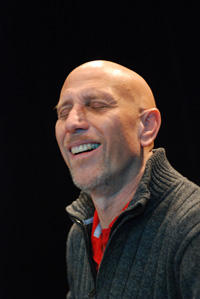"In Conducting 211 and 212, I aim to show students what it takes to prepare a score for performance and give an overview of what conducting is all about. A production engineering student, for example, gets to see what it takes to conduct an orchestra or an ensemble in a recording session. Somebody's first job might be teaching general music in high school, and as part of their obligation they have to conduct a musical. You just never know which way your career is going to go. So it is one more tool we give our students."
"I'm the resident conductor of the Rhode Island Philharmonic; I also have worked with orchestras in Europe and Latin America. Conducting and teaching are very similar, because when you're conducting an orchestra, you're basically sharing what you know of the score with the musicians. You're teaching, and guiding, and inspiring. The same is true in teaching; you have to be very careful and precise about presenting the information in the most efficient way."
"The most important thing for me is to open students' eyes and inspire in them a curiosity to look deeper. It doesn't matter what it is—it could be microbiology or a symphony by Beethoven. And I want my students to learn that there is more than one way to see the same landscape, musically speaking."
"A few semesters back, we were listening to different versions—with different singers—of an excerpt of La Bohème. As the students listened, I could tell that something clicked. They started talking among themselves and came to a general consensus about the one they preferred. As they talked they realized that it was the ability to communicate that made one particular singer more successful than the others. That was a great 'aha' moment."

